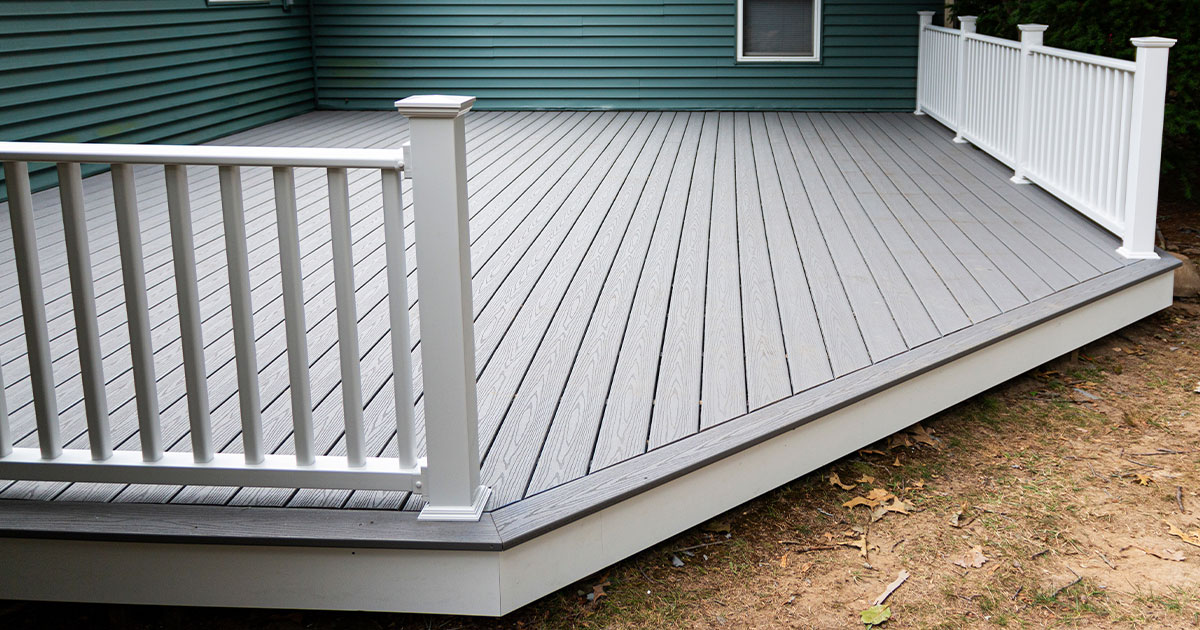How to Pick the Right Materials for Your Deck Installation Job
Selecting the ideal products for your deck setup project can seem complicated. The secret is to balance your budget plan, design choices, and lifestyle requires to produce a deck that will boost your outside space for years to come.
Comprehending the Various Sorts Of Deck Products
When getting started on a deck installation project, the option of materials ends up being a crucial decision. Composite materials, on the other hand, are a mix of wood and plastic, supplying longevity and resistance to weather elements. By understanding these differences, homeowners can make a much more educated choice on the most appropriate deck product for their details requirements.
Reviewing the Durability and Maintenance Requirements of Deck Materials
Assessing the resilience and upkeep needs of deck materials is an essential step in deck setup. Longevity involves the product's ability to stand up to harsh climate conditions, wear and tear, and its longevity.
Understanding upkeep requirements is similarly essential. Some products require routine sealing or tarnishing to preserve their look and resist moisture damage, while others, like composite outdoor decking, demand much less maintenance. By assessing these factors, one can pick the most suitable decking material, making sure an equilibrium between sturdiness, upkeep requirements, and visual appeal.
Expense Analysis: Comparing Wood and Composite Decking
Although expense may at first seem like an additional concern, it is a substantial variable when contrasting wood and composite decking. On the other hand, composite decking, while costlier initially, calls for less upkeep, potentially reducing long-term expenses. Possible deck owners must consider their budget and desire to keep their decks when determining in between wood and composite outdoor decking.
Looks and Layout Flexibility of Decking Products
While cost is a crucial factor to consider, the aesthetic allure and design versatility of decking products additionally play a substantial duty in the decision-making process. Different materials offer varying degrees of aesthetic appeal. As an example, natural wood decking offers a traditional, timeless look, while composite products use a wide variety of colors and appearances to fit varied preferences and designs. In a similar way, layout flexibility refers to the capacity to form and control the outdoor decking material to fulfill particular design needs. Wood, for instance, uses high layout flexibility as a result of its ease of reducing and forming. Composite products, while less adaptable in design, are still versatile enough for many deck layouts. These elements, as a result, are critical components in the selection of decking product.
Ecological Influence of Decking Products
When picking outdoor decking products, one should consider not only aesthetics and durability, yet also the ecological impact. It is very important to analyze the sustainability of materials and explore recycled outdoor decking choices. Understanding the prospective effect on regional ecological communities will make certain a much more eco accountable choice.
Assessing Material Sustainability
In the world of deck construction, examining product sustainability is an essential step. Composite decking materials commonly integrate timber and plastic, lowering the need for brand-new hardwood yet increasing dependence on fossil gas - deck installation. Hence, the selection of outdoor decking products should balance performance, looks, cost, and sustainability to ensure a responsible and lasting installation.
Recycled Decking Options

Composite decking is particularly preferred as a result of its toughness and simplicity of upkeep. It's immune to rot, bugs, and fading, making it a lasting option. Recycled plastic outdoor decking, on the other hand, is very durable and needs very little maintenance. While these products may carry a higher preliminary cost, their long life and reduced ecological effect make them a wise financial investment for the eco-conscious property owner.

Influence on Local Environments
While the advantages of making use of recycled products for outdoor decking can not be overstated, it's similarly important to take into consideration the broader ecological implications of these selections. The removal, handling, and transportation of products can exceptionally affect regional ecological communities. Deforestation for lumber decking contributes to environment loss and environment adjustment. Also the manufacturing of composite materials can launch unsafe exhausts. Alternatively, making use of recycled or sustainably sourced materials can assist minimize these results. Taking into consideration the life expectancy of products can lower environmental impact; longer-lasting alternatives call for much less frequent substitute, hence preserving sources. Lastly, proper disposal of old outdoor decking is essential to decreasing landfill waste (deck installation). Basically, an eco-conscious deck task needs careful material selection, sustainable sourcing, helpful resources and liable disposal.
Making Your Last Choice: Tips for Choosing the most effective Deck Materials
As the article changes right into the subtopic of "Making Your Last Decision: Tips for Choosing the Finest Deck Materials", it is essential to comprehend the variety of deck products readily available. Striking a balance between durability and aesthetics is important in this selection process. The following conversation will guide readers in making an educated option based upon these vital factors to consider.
Comprehending Various Deck Materials
The job of choosing the ideal products for your deck setup can appear daunting due to the vast variety of alternatives readily available. Nevertheless, comprehending the different products can streamline this procedure. Timber is a popular option, supplying a traditional visual and cost. Sorts of wood utilized consist of pressure-treated lumber, cedar, and redwood. Compound materials, made from a mix of wood and plastic, are low-maintenance and resistant to rot and bugs. Vinyl or PVC decks are also a lot more resilient and require less upkeep than composite products, but they can look much less natural. Light weight aluminum decks are solid, lightweight, and resistant to rot, but they are also the most pricey choice. Each product has its very own benefits and drawbacks, making it critical to consider your certain demands prior to making a last decision.
Durability vs. Appearances Equilibrium
Stabilizing toughness with aesthetic appeals can be an obstacle when choosing deck materials. The decision commonly boils down to personal choices and the deck's planned use. High-traffic areas might demand long lasting materials like composite decking, which holds up against deterioration however might do not have the all-natural beauty of timber. On the various other hand, wood provides an ageless allure and warmth that artificial products battle to reproduce. It calls for a lot more upkeep look at this web-site and may not last as long. As a result, house owners require to strike an equilibrium, taking into consideration both the deck's practical demands and their aesthetic choices. By doing so, they can ensure their deck remains a practical and appealing outside room for many years ahead.
Final thought
To conclude, selecting the right products for your deck setup project calls for careful consideration of elements such as toughness, maintenance, price, aesthetic appeals, and environmental impact. Whether you go with traditional wood or composite materials, your option must straighten with your spending plan, style preferences, and lifestyle. Eventually, the most effective outdoor decking product is one that improves your outside area and supplies pleasure for many years ahead.